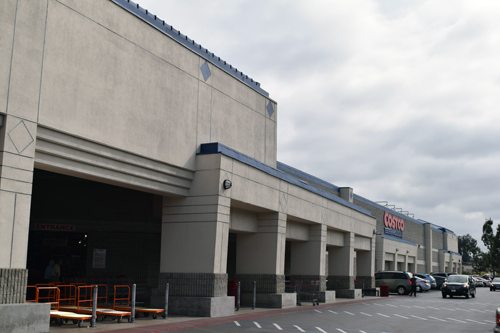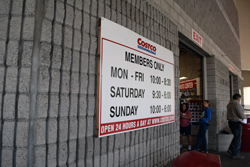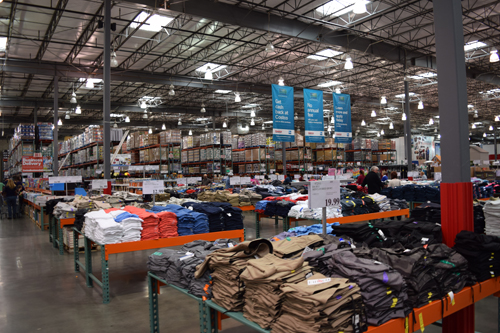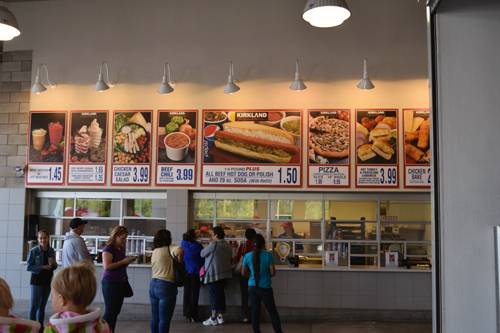
-39th in a Series–
Exit 12, Fletcher Parkway/ Baltimore Drive, La Mesa ~ Costco
By Donald H. Harrison


LA MESA, California — As Costcos go, the wholesale warehouse at 8125 Fletcher Parkway in La Mesa is not much different from other Costco warehouses in the United States and around the world. However, by stopping here for a moment (and who doesn’t like lower prices on an endless variety of items?), we have the opportunity to reflect on the such people as Sol Price, Robert Price, Jim Sinegal, and Jeffrey Brotman. All but Sinegal are Jewish community members.
The idea of the big box warehouse club started with Sol Price, who developed the concept with his Fedmart chain, and later honed it to a skill with his Price Clubs. In essence, the secret behind his success–which was amplified by his son Robert Price–was keeping the profit margin low and the sales volume high. For consumers, who paid an annual membership fee, the difference between Price Club prices and those at other stores made Price Club membership a highly-sought passport to bargains. Price believed in paying his employees well and he encouraged them to join a union, with which he bargained cordially and worked collegially. The result was that Price Club employees were much higher paid than people in similar jobs at other “big box” wholesalers (Walmart for example) and there was far less turnover.

Sinegal, who grew up here in La Mesa, started learning the “big box warehouse” business at Fedmart, and became one of the executives who developed under Sol Price’s tutelage. After having served as an executive vice president of Price Club, Sinegal left to form his own consulting company, worked briefly with Builders Emporium, and later still, in 1982, he co-founded Costco with Jeffrey Brotman, son of Bernie Brotman, the founder of a Seattle-based chain of clothing stores.
As Price Clubs grew from its San Diego base, so too did Costco grow from its headquarters in Seattle. But Walmart was growing even faster and taking a larger piece of the market. In 1993, Price Club and Costco merged into PriceCostco, but philosophical differences between Sinegal and the Prices led to the latter leaving the company a year later. Thereafter Costco Wholesale, as the successor business run by Sinegal and Brotman was called, focused on sales in the U.S. The Prices meanwhile formed Price Enterprises, which delved into both wholesale sales and real estate development. PriceSmart, under Robert Price, developed new warehouse-style wholesale businesses in Latin America and the Caribbean.

Kirkland brand name product, including fast food, took name from Kirkland, Washington, where Costco had its first headquarters
All the men in this story–the Prices, Sinegal, and Brotman–became renowned as philanthropists, with Sinegal and Brotman focusing largely on the Pacific Northwest and the Prices devoting much of their attention and financial resources to the reinvigoration of City Heights, an urban neighborhood in San Diego where immigrants from many countries have lived amid deteriorating city infrastructure.
The Prices helped bring a new police station, library and recreational opportunities to the area, as well as apartment and office complexes. The Prices also partnered with San Diego State University and the San Diego Unified School District to develop programs for economically disadvantaged students. In Israel, meanwhile, the Prices sponsored a similar effort to revitalize the Port of Jaffa, the largely Arab waterfront area serving the city of Tel Aviv. Price Charities also is a major donor to the Biblical Zoo in Jerusalem, a public facility visited by Israelis and tourists of every religion and ethnicity.
Up in the Seattle area, Brotman and his wife Susan are major donors to the Seattle Art Museum (SAM), and to the Pacific Northwest Ballet as well as to the University of Washington, on which Jeffrey serves as a regent.
From Fletcher Parkway exit 13 proceed on Fletcher Parkway to Costco, which will be on right hand side of the street
*
Harrison is editor of San Diego Jewish World. He may comment to him directly via donald.harrison@sdjewishworld.com, or post your comment on this website provided that the rules below are observed.
__________________________________________________________________
Care to comment? We require the following information on any letter for publication: 1) Your full name 2) Your city and state (or country) of residence. Letters lacking such information will be automatically deleted. San Diego Jewish World is intended as a forum for the entire Jewish community, whatever your political leanings. Letters may be posted below provided they are responsive to the article that prompted them, and civil in their tone. Ad hominem attacks against any religion, country, gender, race, sexual orientation, or physical disability will not be considered for publication. There is a limit of one letter per writer on any given day.
__________________________________________________________________
Interesting read!
–Mimi Pollack, La Mesa, California